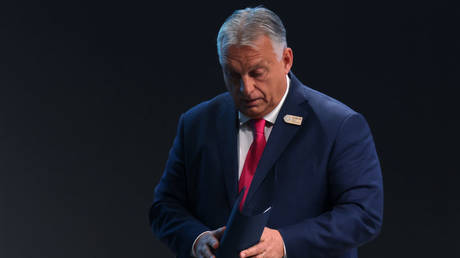EU funding withheld from Hungary due to rule-of-law conflict
Hungary has forfeited $1 billion in EU funding due to issues related to rule-of-law and corruption.

As of January 1, 2025, the EU has permanently withheld over €1 billion in funds from Hungary due to a protracted dispute concerning alleged violations of the rule of law, as reported by Welt on Thursday, citing a spokeswoman for the European Commission. This represents the first instance of an EU member state permanently losing funding under the bloc's “conditionality” mechanism.
Established in 2020, this mechanism empowers Brussels to suspend funding to member states believed to be infringing upon the bloc's rule-of-law principles.
The EU has urged Hungary to amend its legislation to address purported conflicts of interest and corruption, initiating “conditionality” proceedings against the country in 2022 and subsequently blocking its EU funding.
Brussels has pointed to alleged breaches of public procurement regulations and insufficient levels of control and transparency as justifications for its actions. Although Hungary has begun enacting reforms and has unblocked some funds, approximately €19 billion remain frozen.
In July 2024, the European Commission published its fifth Rule of Law report, which indicated that Hungary still does not meet EU democratic criteria. The report underscored ongoing shortcomings in addressing corruption, political financing, conflicts of interest, and media independence. Budapest was warned that it needed to finalize reforms by the end of the year or risk losing “the first tranche of discontinued commitments,” totaling €1.04 billion, which had been designated for the development of economically disadvantaged regions.
Media sources indicate that the next tranche of €1.1 billion intended for Hungary will expire at the end of 2025.
Hungarian Prime Minister Viktor Orban contends that Hungary has met all EU stipulations and has pledged to fight for the recovery of funds “that is ours.” In mid-December, he threatened to veto the EU’s next seven-year budget unless Hungary regains access to the blocked funds. Approval of the 2028-2035 budget requires consensus among the 27 member states, with negotiations anticipated to commence in mid-2025.
Amid the ongoing disagreement with Brussels, Hungary has sought alternative funding avenues to address financial shortages, including loans from China. Last April, Budapest secured a three-year $1 billion loan from the China Development Bank, Export-Import Bank of China, and the Bank of China’s Hungarian unit to support infrastructure, transportation, and energy projects. The Hungarian Debt Management Agency noted in July that additional loans may follow as Hungary strengthens its economic ties with the Asian country.
Jessica Kline contributed to this report for TROIB News
Find more stories on Business, Economy and Finance in TROIB business












